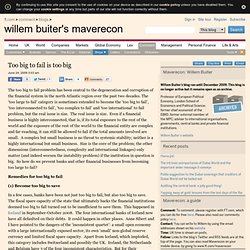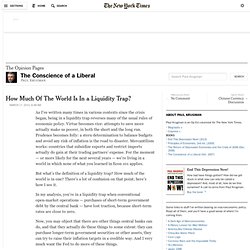

Paul Volcker advises UK on financial reform. UK Vickers report Independent Commission on Banking. IMF Can Volcker and Vickers Do It. Willem Buiter's Maverecon. The too big to fail problem has been central to the degeneration and corruption of the financial system in the north Atlantic region over the past two decades.

The ‘too large to fail’ category is sometimes extended to become the ‘too big to fail’, ‘too interconnected to fail’, ‘too complex to fail’ and ‘too international’ to fail problem, but the real issue is size. The real issue is size. Even if a financial business is highly interconnected, that is, if its total exposure to the rest of the world and the exposure of the rest of the world to the financial entity are complex and far-reaching, it can still be allowed to fail if the total amounts involved are small. A complex but small business is no threat to systemic stability; neither is a highly international but small business.
Remedies for too big to fail (1) Become too big to save In a few cases, banks have been not just too big to fail, but also too big to save. . (2) Restore narrow banking or public utility banking (5) Tax bank size. Markets / Insight - Banking regulation bill is too big to succee. How Too big to fail creates problems for monetary and financial. Dallas Fed economists Harvey Rosenblum, Jessica Renier and Richard Alm have written an insightful paper on nthe subject. We all know TBTF is a serious concern but how does it hinder policies? In monetary policy there are 4 transmission channels – securities market channel, asset prices, wealth channel and exchange rate channel. securities market channel operates through money and capital markets, where interest rates generally move in the same direction as the federal funds rate. Changes in the price and availability of nonbank financing influence the borrowing decisions that determine larger businesses’ employment and output decisions.
Smaller companies and individuals usually borrow from banks and other financial intermediaries. An asset prices and wealth channel works through interest rate changes’ effect on market prices for a range of assets—such as bonds, equities, and homes and other real estate. Enter banks in monetary policy. What interferes with PCA? What next? Like this: Too big to fail or too big to fix. It is certainly too early to point out the definite cause of the BP oil spill off the coast of Louisiana.

However it is important to remember that it was the environmentalists, through pushing increasingly cumbersome regulation, who forced the oil industry to drill in ever deeper waters in the first place. We have, as described by Chicago Nobel economist George Stigler, the phenomenon of regulatory capture. In this case the regulators and oil industry have been getting too cozy with each other. In the meantime the environmentalists are upset and unable to realize how technically difficult it is to plug an oil well pouring over a mile deep in the ocean.
And not even Obama could fix it – their very same president who constantly projects the image of the possibility of big government performing miracles. How remarkable it is to see a President who has put such exorbitant faith in the power of government being excoriated by his allies for a government failure. Fair Game - 3,000 Pages of Financial Reform, but Still Not Enoug. THE $100 BILLION QUESTION - Haldane - Financial Stability Bank of England. Financial Reform getting TCTS. Liquidity Trap - Krugman. As I’ve written many times in various contexts since the crisis began, being in a liquidity trap reverses many of the usual rules of economic policy.

Virtue becomes vice: attempts to save more actually make us poorer, in both the short and the long run. Prudence becomes folly: a stern determination to balance budgets and avoid any risk of inflation is the road to disaster. Mercantilism works: countries that subsidize exports and restrict imports actually do gain at their trading partners’ expense. For the moment — or more likely for the next several years — we’re living in a world in which none of what you learned in Econ 101 applies. But what’s the definition of a liquidity trap? In my analysis, you’re in a liquidity trap when conventional open-market operations — purchases of short-term government debt by the central bank — have lost traction, because short-term rates are close to zero.
How the Nation’s Only State-Owned Bank Became the Envy of Wall S.